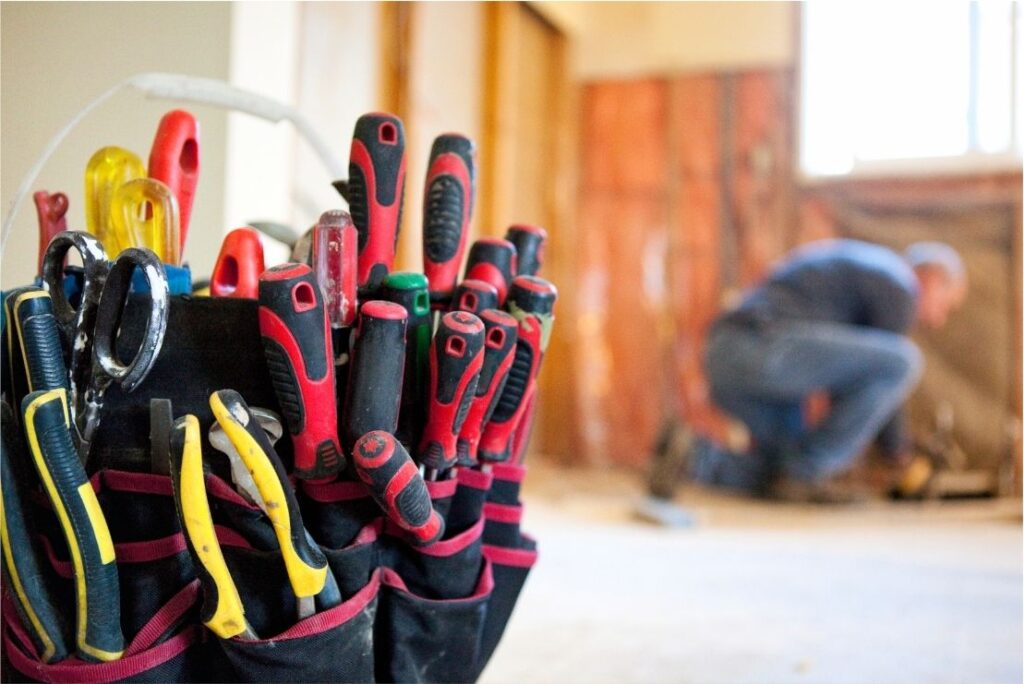Whether you’re a seasoned homeowner or a first-time seller, deciding to renovate before listing your property is significant. Renovations can add value to your home and attract potential buyers. Still, they can also be costly and time-consuming if not approached strategically. To help you navigate this process successfully, we’ve gathered insights from trusted realtors on the top ten home renovation mistakes to avoid before selling your home.
Table of Contents
- Over-Personalizing Your Space
- Neglecting Curb Appeal
- Overlooking Minor Repairs
- Ignoring Professional Cleaning
- Skimping on Quality
- Overinvesting in Major Renovations
- Ignoring the Home’s Flow
- Choosing Highly Trendy Finishes
- Failing to Neutralize Odors
- Not Staging Your Home
Why Hire a Professional Realtor When Selling Your Home
FAQs Section
| Key Takeaways ● Neutralize personal decor to appeal to a broader range of buyers. ● Enhance curb appeal to make a solid first impression on buyers. ● Address minor repairs to showcase a well-maintained home. ● Professional cleaning can significantly boost your home’s appeal. ● Invest in quality renovations for a better return on investment. ● Avoid overinvesting in major renovations with minimal returns. ● Ensure your home’s layout flows well for potential buyers. ● Stage your home effectively to highlight its best features. |
1. Over-Personalizing Your Space
While unique colors, bold design choices, and personal memorabilia can make your space feel distinctly yours, they may not resonate with potential buyers. According to seasoned realtors in Danbury, CT, like Lavelle Remax, spaces painted in neutral tones and decorated with broad appeal in mind tend to attract a wider audience. This approach helps buyers envision their lives in the space rather than feeling like they’re stepping into someone else’s domain.
To rectify over-personalization:
- Repaint walls in neutral colors to appeal to a broader audience.
- Remove personal items and collections that might not be universally appealing.
- Opt for simple, classic furniture and decor to stage the home.
- Seek advice from realtors like Lavelle Remax for insights on making your home appeal to the broadest possible buyer base.
- Consider minor updates that can refresh the space without reflecting a specific style too strongly, such as updating hardware or lighting fixtures.

2. Neglecting Curb Appeal
Neglecting curb appeal impacts a home’s sale potential. According to a recent survey, 99% of National Association of REALTORS (NAR) members agree that curb appeal is crucial in drawing in potential buyers. Enhancing the exterior can lead to quicker sales and higher offers, so presenting a welcoming and well-maintained facade is essential.
To enhance curb appeal:
- Repaint the front door to add a welcoming pop of color.
- Regularly trim and maintain the lawn and garden areas for a neat appearance.
- Install new, modern outdoor lighting fixtures to improve visibility and security.
- Repair damaged pathways, driveways, and steps to ensure safety and visual appeal.
- Place decorative planters near the entrance to introduce vibrancy and warmth.
3. Overlooking Minor Repairs
A well-maintained property suggests to buyers that it has been cared for, which reduces concerns about hidden problems. Conversely, minor issues like leaky faucets, squeaky doors, or cracked tiles can lead to perceptions of neglect, which can lower the home’s value in the eyes of buyers.
To address overlooked minor repairs:
- Fix leaky faucets and running toilets to eliminate water waste and noise.
- Repair or replace damaged floor tiles to enhance the appearance of floors.
- Oil squeaky hinges on doors and cabinets to improve function and reduce noise.
- Patch and paint over small holes or wall marks for a clean look.
- Ensure all light fixtures work and replace burnt-out bulbs for better illumination.
4. Ignoring Professional Cleaning
Ignoring professional cleaning before listing your home can be a costly mistake. A clean house looks more appealing and gives the impression of a well-maintained property, which can significantly impact a buyer’s decision. Professional realtors stress the importance of a spotless environment in making a home more attractive to potential buyers.
To ensure your home is ready for showings:
- Hire a professional cleaning service to deep clean the entire house, including hard-to-reach areas.
- Ensure carpets are shampooed and stains are removed to refresh the space.
- Clean windows inside and out for natural light to enhance the home’s features.
- Pay special attention to bathrooms and kitchens; these areas are crucial to buyers.
- Address any pet odors or smoking smells, as these can be particularly off-putting to visitors.

5. Skimping on Quality
High-quality workmanship and materials enhance your home’s aesthetic appeal, longevity, and overall value. Buyers are often willing to pay more for homes that demonstrate attention to detail and quality improvements, considering them better investments in the long run. Cutting corners may save money initially but can lead to lower offers and reduced interest from potential buyers, who are increasingly savvy about spotting cheap fixes.
To ensure quality in your renovations:
- Choose durable, high-quality materials that will stand the test of time.
- Hire reputable contractors with a track record of quality work.
- Focus on critical areas like kitchens and bathrooms, where quality upgrades can significantly impact your home’s value.
- Consider energy-efficient upgrades that appeal to environmentally conscious buyers.
- Don’t overlook the importance of quality paint and hardware finishes to complete the look of your renovation.
6. Overinvesting in Major Renovations
A common mistake homeowners make is assuming that large-scale upgrades yield equally significant returns. However, as pointed out by experienced realtors, the reality is that not all major renovations significantly increase a home’s selling price. Some can even deter potential buyers who might not value these upgrades as highly as expected or prefer to customize the house themselves.
Realtors often advise focusing on updates that improve the home’s general appeal and functionality rather than on expensive, taste-specific upgrades.
Examples of major renovations to avoid include:
- Extensive kitchen overhauls that cater to specific tastes rather than general appeal.
- Adding luxury amenities like swimming pools or elaborate landscaping, which not all buyers will pay extra.
- Converting garages into living spaces might not appeal to buyers prioritizing parking or storage space.
7. Ignoring the Home’s Flow
A well-thought-out layout enhances the living experience, making spaces feel more open, connected, and functional. Realtors often highlight that homes with awkward layouts or choppy, disconnected rooms can be more challenging to sell as they disrupt the natural movement through the house. It can also make spaces feel smaller or less usable.
To improve your home’s flow:
- Remove unnecessary walls to create an open-concept layout, which is highly sought after by today’s buyers.
- Rearrange furniture to ensure a clear and logical path through each room.
- Consider the function of each space and arrange it to suit its purpose, such as creating a seamless transition from the kitchen to the dining area.
- Use consistent flooring throughout the house to visually expand the space and enhance the sense of flow.
- Increase natural light by adding or enlarging windows to make interiors feel more spacious and connected to the outdoors.

8. Choosing Highly Trendy Finishes
Choosing highly trendy finishes can significantly impact the sale of your home, as what’s in vogue today might not be tomorrow. Realtors often warn against incorporating finishes that are too specific to current trends, as these can quickly become outdated. For instance, bold wallpaper patterns, eccentric tile designs, and ultra-modern lighting fixtures might capture attention now. Still, they could deter buyers looking for a timeless space.
Examples of highly trendy finishes to avoid:
- Bold, graphic wallpaper that can overwhelm spaces.
- Overly vibrant paint colors that cater to particular tastes.
- Temporary architectural features like non-traditional door frames or built-ins.
- Specialty room finishes, such as a garage turned into a gym with permanent equipment.
While these choices reflect current design trends, they may not offer the best return on investment. Data indicates that homes with more classic and neutral finishes appeal to a broader audience, which allows for a quicker sale. Realtors advise opting for finishes that maintain the home’s value over time. This ensures it remains attractive to buyers regardless of changing trends and time.
9. Failing to Neutralize Odors
Unpleasant smells, whether from pets, smoking, or mildew, can be significant turn-offs for potential buyers. Realtors emphasize that first impressions are crucial. Bad odors can make a property feel unclean or poorly maintained, regardless of its visual appeal or amenities. Buyers might assume that strong odors indicate deeper, unaddressed issues, which can lead to lower offers or a lack of interest altogether.
To ensure your home is inviting and odor-free:
- Deep clean carpets and upholstery, which can harbor odors.
- Use air purifiers and keep windows open to ventilate the space effectively.
- Address the source of any persistent smells, such as pet areas, to prevent them from returning.
- Consider repainting walls to seal in odors from smoking or cooking.
- Place neutral-scented candles or diffusers around the home for viewings.
10. Not Staging Your Home
Staging prepares a home for sale by arranging furniture, decor, and lighting to highlight the property’s best features and help buyers envision themselves living there. Realtors often stress the importance of staging, which can dramatically influence buyer perceptions. Statistics show that staged homes sell up to 88% faster and fetch prices for up to 20% more than non-staged homes. Staging helps buyers visualize the property as their future home, emphasizing its best features and potential.
Tips for successful staging include:
- Declutter and Depersonalize: Clear out personal items and excess clutter. This helps buyers imagine their belongings in the space.
- Rearrange Furniture: Optimize the layout of each room to showcase its size and functionality. Place furniture to create open, welcoming spaces.
- Enhance Lighting: Use bright, warm lights to make the home feel inviting. Open curtains and blinds to let in natural light.
- Neutralize Decor: Paint walls in neutral colors and use simple, tasteful decorations to appeal to a broad audience.
- Add Small Accents: Place elements like fresh flowers or a fruit bowl to add a touch of warmth and homeliness.
- Incorporate Virtual Staging: For online listings, consider virtual staging. This technique uses digital graphics to furnish an empty home or enhance existing spaces in photos to offer an economical and versatile staging solution.
Why Hire a Professional Realtor When Selling Your Home
Selling your home is a significant decision that requires expertise and knowledge of the real estate market. Hiring a professional realtor in Danbury, CT, like Lavelle Remax, can provide you with the necessary support, guidance, and expertise to navigate the sale of your home efficiently and profitably. Here are compelling reasons to consider a professional realtor for your home-selling journey.
Expert Market Knowledge
A professional realtor brings invaluable market knowledge to the table. They understand current market trends, pricing strategies, and the local real estate environment. This expertise lets them price your home competitively, which increases your chances of a successful sale.
Effective Marketing Strategies
Realtors can access various marketing tools and platforms that individual sellers do not. They can list your property on multiple real estate websites, use professional photography, and employ social media strategies to ensure your home reaches a broad audience.
Negotiation Skills
Negotiating is a crucial part of selling your home and can be challenging. Realtors are skilled negotiators who work on your behalf to ensure you get the best possible price for your property, handling offers and counteroffers with professionalism and tact.
Handling Paperwork
The paperwork involved in selling a home can be daunting. Realtors are familiar with all the necessary documents, contracts, and disclosures, ensuring that everything is completed correctly and legally, reducing the risk of potential issues.
Credentials and Certifications
Professional realtors have undergone rigorous training and hold certifications that attest to their expertise in real estate. For instance, being a National Association of Realtors (NAR) member ensures that they adhere to a strict code of ethics and standards of practice.
Access to a Network
Expert realtors like Lavelle Remax have many contacts, including potential buyers, other real estate agents, and professionals like home inspectors and appraisers. This network can be invaluable in finding the right buyer for your home quickly.
Saves Time and Effort
Selling a home requires significant time and effort. A realtor manages viewings, open houses, and inquiries, freeing you to focus on your next move.
Provides Peace of Mind
The most significant benefit of hiring a realtor is the peace of mind it brings. Knowing that an experienced professional is managing the sale of your home, guiding you through each step, and advocating on your behalf can alleviate much of the stress associated with selling property.
How to Choose the Right Realtor
Choosing the right realtor is a crucial step in the home selling or buying process. Here are several tips to help you make the best choice:
Assess Their Communication Style
Choose a realtor who communicates clearly and promptly. Your realtor should be accessible and willing to answer your questions in a way that makes you feel informed and comfortable.
Ask for References and Reviews
Request references from past clients to get firsthand accounts of their experiences. Online reviews and testimonials can also provide insight into the realtor’s working style and success rate.
Ensure They Offer Support Through Closing
A good realtor will guide you through the entire process, from listing or searching for homes to closing the deal. Confirm that they will be there to navigate negotiations, inspections, and any issues.

FAQs Section
How important is it to get a pre-sale home inspection?
Realtors highly recommend a pre-sale home inspection. It can uncover hidden issues you may not know, allowing you to make necessary repairs before listing. This proactive approach can prevent surprises during the buyer’s inspection, streamline the sale process, and increase your home’s value.
Can the time of year affect the sale of my home?
Yes, the time of year can significantly impact your home sale. Seasonal trends vary by market, but spring and summer are peak times for buyers. Realtors can provide insights on the best timing for your area, maximizing your chances of a successful sale.
Should I be present during home showings?
Realtors often advise sellers not to be present during home showings. This allows potential buyers to freely explore and envision themselves in the space without feeling watched or pressured, creating a more comfortable environment for decision-making.
How does the local real estate market affect the selling price of my home?
The local real estate market determines your home’s selling price. Supply and demand, economic conditions, and local amenities influence market trends. A knowledgeable realtor can help you understand these factors and set a competitive price for your home.
How long does it typically take to sell a home?
The time it takes to sell a home can vary widely based on location, market conditions, and the property itself. Realtors can offer insights based on similar homes in your area, but preparing for flexibility is essential. Factors such as pricing it right, effective marketing, and the home’s condition all play a significant role in the timeline of the sale.
Elevate Your Home Sale with Lavelle Remax!
Consulting with a professional realtor can provide valuable insights into which renovations will likely increase your home’s value and appeal to potential buyers. Discover the unparalleled expertise of Lavelle Remax, Danbury, CT’s premier real estate firm. Home to the most knowledgeable and dedicated realtors in the area, Lavelle Remax ensures your home selling experience is successful and stress-free. Contact us today to partner with a top-tier realtor and elevate your home sale.




